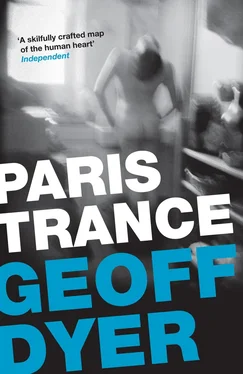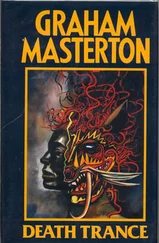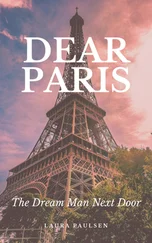‘Nothing if not predictable. See you later.’ She kissed him on the cheek and put on her new coat, the one she had bought in Belgrade.
She was early for her appointment. The interviewer, her prospective employer, was late. His secretary made Nicole a coffee and said she could go through and wait in his office. She picked up the photo on his desk: wife and child, smiling, happy. She was surprised by how intensely she disliked this picture. It wasn’t the people in the photo she disliked: it was the executive convention of having such a picture on your desk. The daily presence of the photograph, its sheer obviousness, probably meant that the executive-husband became oblivious to it. Pictures like that didn’t help you to remember people, they helped you to forget them, and having one on your desk like this was a conventionally coded declaration of status: I am in a position to have framed snaps of my wife and children on my desk. And this advertisement, she suspected, was also a come-on. I have a wife and kids, the picture declared, therefore I do not try to sleep with my secretary or colleagues. But that statement somehow enhanced the chances of his being able to contradict it, to prove it wrong. By comparison the torn centrefolds, the oil-smeared nudes that mechanics stuck up on their workshop walls were images of felicity and integrity, faithfulness. She thought of the Polaroids she and Luke had taken: his face in her pubic hair, his swollen penis in her mouth, disappearing between the blur of her buttocks. . If she became head of a company, she decided, these were the pictures she would have on her desk. Either that or the one of Luke when he was a little boy, in his cowboy hat. She was chuckling to herself when her prospective boss came in.
‘Bonjour,’ he said. ‘Vous avez l’air tout guilleret.’
‘C’est à dire, oui, je suis en train de penser à un truc tellement drôle.’ She stood up, held out her hand. He was forty, handsome, smartly dressed, had kept himself in shape. She saw his eyes take stock of her, could almost see the thought bubble coming out of his head like in an American comic: ‘Well, get a load of this . .’
From that moment on it was obvious she was going to get the job.
She started the following Monday, the day the coldest weather for fifty years swept into the city like an invading army. It was so cold that Nicole was on the brink of abandoning her bike — unheard of — and travelling to work on the Métro. The cold was unbelievable, exciting. Things stopped working. Trains became glued to the tracks. Streets were stained with the frozen piss of dogs. Soil froze hard as iron, iron became brittle. Fountains froze into meringues. News bulletins were given over almost entirely to discussing the weather (effectively, the news had been replaced by the weather). It was too cold to snow. Old people were urged to stay at home. The freezing winters of Chicago and Stalingrad were invoked constantly. Luke looked, aghast, at the electricity meter in the apartment, spinning round at the speed of a compact disc. He was better off at the warehouse, at Ice Station Zebra, as Alex had taken to calling it.
Then the warm weather — the weather that was simply cold as opposed to glacial — returned and life settled into its drab winter norm. It drizzled the whole time, as if the sky were a pipe that had frozen, burst, thawed, and was now leaking over the city.
At the beginning of March Sahra and Alex moved into a new apartment together. Alex’s sub-let had come to an end and Sahra’s place was barely large enough for her, let alone for both of them. They were getting desperate when they found the perfect apartment — at a far lower rent than they had expected. Since they were both foreigners and neither of them had salaried jobs, however, the landlord was reluctant to let it to them. Another couple were also interested and it was only by offering to pay six months’ rent, in advance, in cash, by the next morning, that Alex and Sahra were able to swing it. Luke and Nicole — who had to ask her new boss, Pierre, for an advance on her wages — lent them half the money and the rest they cobbled together with credit and bank cards.
The apartment was over a watchmaker’s. Right outside their window was a large clock which kept perfect time. Across the road was a cinema, so near, Alex insisted, that it was possible to check the time on the clock, see that the film was about to start and still get to your seat without missing anything. It was a good cinema but, over the years, many of the letters used to display the films that were showing had been lost. Substitutes were used — W (upsidedown) for M, N (sideways) for Z — but Alex and Sahra suspected that the programme was determined, principally, by the availability of letters. It seemed a good omen: the contingent letters of the cinema echoed the message Alex had constructed on the door of the fridge.
Nicole and Luke helped them move in and arrange the apartment (pride of place was given to Nicole’s catherine wheel light) but, for them, the big event in March was the arrival of Spunk. Nicole liked her new job and had settled quickly into the routine of going to an office. It brought an element of stability and purpose into her life with Luke, creating the conditions in which they could think about acting on one of their longest-held wishes: to get a dog. They both wanted a dog but neither could face the responsibilities of looking after it. They wanted a dog that didn’t smell, moult, eat or — heaven forbid — shit. No such breed existed. Then, in the aftermath of their worst quarrel, Luke found the perfect specimen.
It was a Sunday. They had been cooking lunch together: curry. Nicole was wearing the sweater she had bought for him at Christmas. Luke loved seeing her in it. He picked up a jar of pickle by the lid. The jar crashed to the floor and smashed.
‘You know, one day I’m going to draw up a list of all the things you haven’t put the tops back on,’ Luke said as he began clearing up the mess. ‘Maybe even sub-divide it, for ease of classification, into jars — glass tins, I mean — pots, bottles and tubes. Under bottles, for example, we would have: olive oil, mineral water, shampoo et cetera. Under tubes, toothpaste. .’
‘You can’t think of anything else that comes in a tube can you?’ said Nicole. She was leaning against the cooker.
‘Actually I can’t, but the general point still applies. Put a lid on it.’
‘Why don’t you pick things up properly? That only smashed because you picked it up by the lid.’
‘I’ll tell you what Nicole. Put a fucking lid on it.’
‘You put a fucking lid on it.’ She had still not got the hang of swearing convincingly in English.
Luke kissed her. ‘You know, the things I love about you are absolutely the things that drive me out of my mind with irritation too. I don’t want you to put lids on things because I love the way you don’t put lids on things.’
‘But you wish I did put lids on things?’
‘Exactly.’
‘And it never occurs to you that I might be irritated by things you do?’
‘Actually, now you come to mention it, no. Are there?’
‘Yes, of course.’
‘Like what?’
‘The way you always splash in the bathroom, for example.’
‘When I’m pissing?’
‘No, when you’re wash ing. You splash everywhere. You don’t wash, you splash.’
‘To wash is to splash. To wash brackets verb: to splash water on one’s face. What’s that smell? Is something burning?’
‘I think so.’ She turned away from the cooker to check what was burning and Luke saw immediately that it was his sweater. In flames. He grabbed the washing bowl out of the sink and emptied the soapy water over her. Water and cutlery sloshed and clattered to the floor. They stared at each other. She was soaking. The kitchen floor was drenched. The curry they had been cooking was awash with grey suds.
Читать дальше












